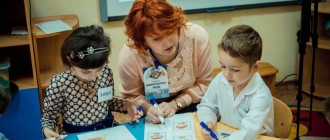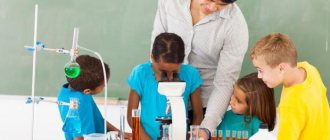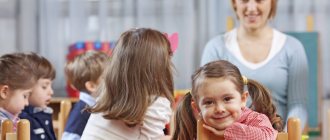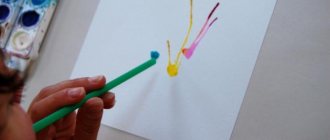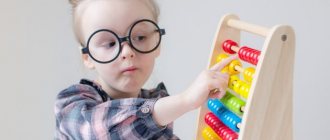How to choose a topic for self-education?
There are only two main criteria:
- requirement to study the topic from the outside (formulated in regulatory documents, in particular, in the Federal State Educational Standard for Preschool Education);
- the work of the teacher himself (lack of experience and knowledge to resolve a particular pedagogical situation).
Thus, before choosing a topic, you need to familiarize yourself with the regulatory framework for preschool education and analyze your own experience.
According to the Federal State Educational Standard, a preschool child develops in the following areas:
- social and communicative;
- educational;
- speech;
- artistic and aesthetic;
- physical.
Requirements for the preparation of documentation for self-education
Self-education documentation should be filed in a binder and divided into the following sections:
- A title page that should indicate:
- full name of the educational institution;
self-education materials;
- Full name of the teacher, his qualification category;
- the topic of self-education.
- Content;
- Topic, purpose of the work and main tasks that must be solved in the process of self-education activities;
- Expected results;
- Work plan drawn up for the academic year;
- Implementation of acquired knowledge in practice. Teachers can do this in the following ways:
- holding an open lesson;
preparation and holding of the seminar;
- conducting a master class for teachers on a chosen topic;
- design of a moving folder;
- compiling a collection of advice for parents, etc.
- Bibliography
Approximate topics of self-education for a preschool teacher according to the Federal State Educational Standard (2017 and later)
In accordance with the identified areas, topics on self-education for kindergarten teachers according to the Federal State Educational Standard can be as follows:
- Methods and means of amplification of preschool child development.
- Pedagogical diagnostics in a preschool institution.
- Individual approach in preschool education.
- Means and methods of developing safe life skills in preschoolers.
- Development of emotional intelligence in preschoolers.
- Guiding the play activities of preschool children.
- Cultivating kindness in preschoolers.
- Raising responsiveness in preschool children.
- Fostering sense of purpose in preschool children.
- Cultivating honesty and truthfulness in preschoolers.
- Formation of ideas about the small homeland among preschoolers.
- Development of creative abilities in preschool children.
- Formation of prerequisites for educational activities in children of senior preschool age.
- Cultivating curiosity in preschoolers (in classes, in communication, play, work).
- Formation in preschoolers of ideas about the signs, qualities and properties of objects in the surrounding world.
- Familiarization of preschoolers with the biocenosis of a forest (meadow, pond).
- Formation of ideas about space in preschoolers.
- Formation of ideas about inanimate nature in preschool children (natural phenomena, seasons, change of day and night).
- Formation in preschoolers of ideas about the shape, size, spatial relationships of objects.
- Formation of the concept of number in preschoolers.
- Development of forms of communication in preschoolers.
- Development of coherent speech in preschool children (in communication, play).
- Teaching children 4-7 years old basic analysis of a literary work.
- Teaching preschoolers to retell literary works.
- Teaching preschoolers to read poems expressively.
- Creative storytelling in kindergarten.
- Literacy training in preschool educational institutions.
- Non-traditional techniques of visual activity in kindergarten.
- Health-saving technologies in preschool education.
- Formation of cultural and hygienic skills in children of early and preschool age.
- Formation of self-service skills in preschoolers.
- Creating psychological comfort in a preschool group.
- Computer technologies in preschool education.
- Continuity of preschool and primary education.
- Psychological and pedagogical assistance in the family in the education and development of preschool children.
In 2016, changes and additions were made to the Federal State Educational Standard, in particular, on the education of children with disabilities. In this regard, one of the self-education topics for kindergarten teachers according to the Federal State Educational Standard 2022 could be:
- "Inclusive education in preschool settings."
In addition to topics in a specific area, you can choose a topic related to the work of a preschool institution as a whole:
- Planning work in a preschool institution according to the Federal State Educational Standard.
- Developing subject-spatial environment in preschool educational institutions.
- Development of partial preschool education programs.
- Innovative forms of working with parents of preschool children.
The list of topics on self-education for kindergarten teachers according to the Federal State Educational Standard 2022 may include the following topics:
- Variability of preschool education services at the present stage.
- Experimental activities in preschool educational institutions.
- Quality of preschool education: evaluation criteria.
- Social relations in preschool education.
Theoretical aspects of self-education
A good teacher cannot be passive - this is an axiom. Moreover, professional activity is important not only for the individual himself, but also for creating a positive image of a preschool institution, because parents, when choosing a kindergarten for their child, are interested in how proactive the teacher is who will work with children of a particular group. In addition, improving professional skills through self-study is a requirement of the Federal State Educational Standard (FSES) and is reflected in the teacher’s competence, qualifications and salary. Self-education is a purposeful, conscious, active cognitive activity of a teacher, aimed at improving the methods of working with students, enriching one’s own teaching experience in accordance with the modern level of development of pedagogy and psychology.
Always learn, know everything! The more you learn, the stronger you will become.
M. Gorky
https://www.aforism.su/73_5.html
Self-education is a combination of studying the experience of the past and introducing elements of modern pedagogical technologies
According to the Federal State Educational Standard, the educator’s efforts aimed at self-education are based on the need to achieve the following goals:
- get acquainted with and master new pedagogical technologies;
- systematize the work on finding methods to improve the educational process for children in the middle group;
- create conditions for the comprehensive development of wards (physical, mental, mental, emotional).
To achieve your goals, you should work on solving the following tasks:
- learn to apply modern pedagogical technologies in personal practice;
- develop cognitive, labor, and play activity in children;
A variety of didactic games allow children to develop their cognitive activity.
- constantly improve your level of proficiency in methods of working with preschoolers;
- study classical and modern methodological approaches related to the chosen topic of self-education;
- make attempts to generalize and disseminate their own experience.
Principles of self-education
In his work on professional self-improvement, the teacher must be guided by certain principles:
- Continuity. Work on the chosen topic involves its comprehensive coverage throughout the academic year (sometimes 2-3 years).
- Continuity and interconnection. The next topic should be related to the previous one. For example, if a teacher has taken up the topic of spiritual and moral education of preschoolers of the middle group, which implies consideration of the issue in general, then after finishing the work it is logical to take on a more specific aspect, for example, “Spiritual and moral education of children through reading fiction.” Thus, the previous requirement - continuity - will be observed not just within the framework of consideration of one topic on self-education, but in general throughout the entire methodological work of the teacher.
- Compliance with the goals and objectives of the educational process in kindergarten. That is, for institutions that are developing hardening systems, this component should be included in all possible topic formulations. And if a kindergarten works with children who have certain developmental disabilities or health problems (for example, the team cares for children with poor vision), then the topic of the self-education program should reflect this aspect both in the theoretical block and in the practical one.
- Availability of putting theory into practice with a specific group of children. For example, as part of the study of the topic of non-traditional drawing techniques, creating images with soap bubbles in the middle group will not be entirely appropriate, since children do not yet have the required skill in creating the directional movement of an air stream using a breathing apparatus.
The teacher’s task is to find a methodological explanation of this or that technique so that the child can cope independently
It is important. Advanced training is a necessary condition for life in today's rapidly changing world.
Forms of organization of activities
The process of teacher self-education can take place in the following forms:
- Individual: visiting libraries;
- study of scientific, methodological and educational literature on the topic;
- visiting classes of teachers of other groups;
- participation in kindergarten teacher councils and meetings of the methodological association of preschool teachers in the city;
- theoretical development and practical testing of various forms of classes and activities.
The individual form includes independent preparation, selection of information and preparation of a report-speech on the implementation of the idea of self-education
The choice of forms of work depends on which of the participants in the educational process the teacher interacts with at the moment of mastering the topic:
- With kids. Such interaction is realized in the process of educational activities and during leisure time. Takes the form:
- training sessions;
- various kinds of games (including didactic, outdoor);
- walks.
- With parents. Carried out in the form:
- consultations;
- round table meetings;
- pedagogical trainings, during which parents receive practical recommendations, for example, on the speech development of children 4–5 years old.
- With colleagues. This is achieved through the joint organization of master classes, meetings of pedagogical councils, and the methodological association of educators working with a specific age group of children, where opinions are exchanged on the organization of classes, content and teaching methods. Carried out in the form:
- presentations;
- reports;
- publications on resources related to education;
- articles in magazines and other printed publications.
How to work by topic
Work on each of the listed topics begins with an analysis of the literature (an approximate list of sources is given below). When reading books, the teacher identifies the main thoughts, ideas, and judgments of the authors. So, taking up the topic of using didactic games to develop safe life skills in children, the teacher:
- draws attention to the peculiarities of organizing didactic games in different age groups;
- content of work on life safety in preschool educational institutions.
Then the teacher thinks through or also takes from books potentially dangerous situations that need to be avoided, and based on the knowledge gained, compiles a card index of games. He develops games himself or takes them from sources. Systematized materials are tested in practice.
Middle group. Junior preschool age. Children 4 - 5 years old
Self-education plan “Theatrical activities as a means of socialization of children of primary preschool age” Goal: to develop experience in the social skills of behavior of children of primary preschool age, to educate a liberated, socially active preschooler through theatrical activities. Objectives: 1. Analyze psychological, pedagogical and methodological literature. 2….
Self-education plan on the topic “Use of educational games for FEMP in children of primary preschool age” Self-education plan on the topic “Use of educational games for the formation of elementary mathematical concepts in children of primary preschool age.” Relevance of the chosen topic Mathematics should then be taught because it puts the mind in order. M. V. Lomonosov….
